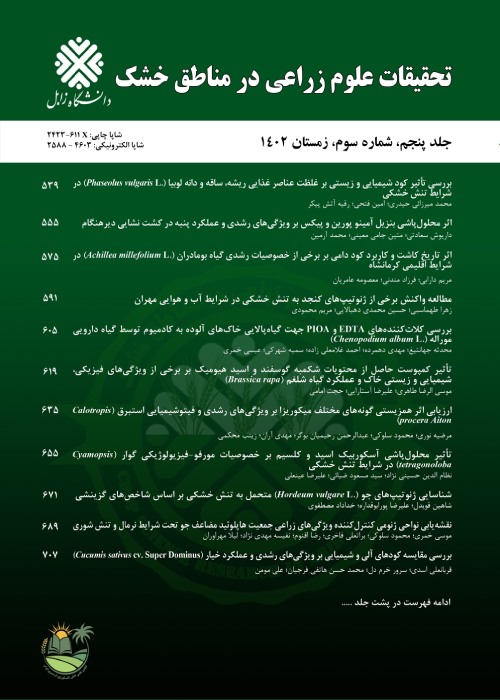Study of physiological tolerance of sugar beet to drought stress with salicylic acid consumption
Environmental factors affect the accumulation of sugar. Light, sunny hours and soil moisture largely determines how sugar is grown and stored at the root of sugar results of the experiment on sugar beet showed that all treatments of anti-stress materials such as salicylic acid, thioufol and glycine at different concentrations increased the quality traits such as root yield, sugar level and white sugar yield. Reducing membrane damage due to the use of salicylic acid is associated with the production of antioxidants, and thus salicylic acid increases the membrane stability against oxidative stress. Salicylic acid is an internal regulator of plant growth that affects metabolic and physiological responses to plant growth and development.Plants obtained from seeds pretreated with salicylic acid can improve the rate of photosynthesis in normal and stress conditions by increasing the relative water content, transpiration intensity, stomatal conductance and leaf chlorophyll index. In a study, it has been observed that salicylic acid treatment controls polysaccharide hydrolyzing enzymes and accelerates the formation of polysaccharides from soluble sugars. With this assumption, salicylic acid increases the amount of insoluble sugars compared to soluble sugars.
In order to adjust the negative effects of drought stress in sugar beet cultivars under the influence of salicylic acid foliar spraying in drought stress conditions, a factorial split plot was used in a randomized complete block design with three replications in Jouin was conducted in 2019. The studied factors included irrigation at two levels of full irrigation and drought stress (50% of full irrigation), salicylic acid spraying at three levels of 0, 2.5 and 5 mM on the Shokofa (034) and Aria (031).
Stress reduced the yield, but the use of salicylic acid increased the yield. Application of 5 mM produced the highest amount of root yield with 16.55. In the condition of full irrigation, the yield increased by increasing the amount of salicylic acid. In the stress conditions, the percentage of impure sugar increased, but in the condition of full irrigation, the percentage of impure sugar decreased, but with the use of five to 2.5 mM salicylic acid, it increased.In condition of drought stress and consumption, 2.5 mM of salicylic acid, 034, have the highest percent sugar content with 20.5%. The amount of proline of 034 cultivar was the highest in drought stress and consumption of 5 mM of salicylic acid. Consumption of salicylic acid increased root yield and sugar content yields and reduced harmful nitrogen and sodium.Drought stress caused a decrease in yield, and this decrease in yield was both qualitative and quantitative. Drought stress decreased sugar yield and root yield in sugar beet by increasing electrolyte leakage from cell membranes, decreasing relative leaf water content, and increasing harmful nitrogen.
The amount of impure sugar (kg/m2) increased with the use of salicylic acid in both drought stress and complete irrigation. Impure sugar, which is the result of multiplying the sugar beet root yield by the percentage of impure sugar and has been affected by salicylic acid, shows that the quantity and quality of both have increased with the use of this hormone-like substance. In this study, salicylic acid was able to increase the absorption of water by increasing the proline and making the osmotic pressure of sugar beet negative by increasing the relative water content of the leaves, and finally, by increasing the impute sugar yield, it increased the root yield and sugar per unit area. The consumption of salicylic acid increased the root yield and sugar level and decreased harmful nitrogen, sodium and potassium.
- حق عضویت دریافتی صرف حمایت از نشریات عضو و نگهداری، تکمیل و توسعه مگیران میشود.
- پرداخت حق اشتراک و دانلود مقالات اجازه بازنشر آن در سایر رسانههای چاپی و دیجیتال را به کاربر نمیدهد.


